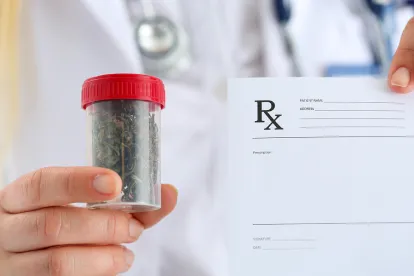Oklahomans voted 57 percent in favor of State Question 788, resulting in the passage of the Oklahoma Medical Marijuana Act (OMMA) on June 26, 2018. Many experts consider the new law to be one of the broadest medical marijuana laws in the United States. (Thirty states and the District of Columbia have now passed laws providing for the decriminalization of medical marijuana.) The law went into effect on July 26, 2018.
Under Oklahoma law, drug and alcohol testing in the workplace is regulated by the Oklahoma Standards for Workplace Drug and Alcohol Testing Act (ODTA). The protections provided to employers under the ODTA make it one of the most employer-friendly workplace drug testing laws in the United States.
Marijuana use, regardless of if it is used for medicinal purposes, remains illegal under the federal Controlled Substances Act of 1970 (CSA).
The ODTA
If an Oklahoma employer chooses to enact a workplace drug and alcohol testing policy, it must comply with the ODTA, which requires that the employer have a written policy that meets certain timing requirements and provisions. Additionally, all employees must be given notice of the policy, or any changes to it, at least 10 days prior to it taking effect. That notice may be provided by email or in a hard copy.
Testing for drugs or alcohol may be conducted as is specifically set out in the employer’s policy in any of the following situations:
- “Applicant and transfer/reassignment testing: A public or private employer may request or require an applicant to undergo drug or alcohol testing and may use a refusal to undergo testing or a positive test result as a basis for refusal to hire. A public or private employer may also request or require an employee who transfers to a different position or job, or who is reassigned to a different position or job, to undergo drug or alcohol testing;
- For-cause testing: A public or private employer may request or require an employee to undergo drug or alcohol testing at any time it reasonably believes that the employee may be under the influence of drugs or alcohol, including, but not limited to, the following circumstances:
- drugs or alcohol on or about the employee's person or in the employee's vicinity,
- conduct on the employee's part that suggests impairment or influence of drugs or alcohol,
- a report of drug or alcohol use while at work or on duty,
- information that an employee has tampered with drug or alcohol testing at any time,
- negative performance patterns, or
- excessive or unexplained absenteeism or tardiness;
- Post-accident testing: A public or private employer may require an employee to undergo drug or alcohol testing if the employee or another person has sustained an injury while at work or property has been damaged while at work, including damage to equipment. For purposes of workers' compensation, no employee who tests positive for the presence of substances defined and consumed pursuant to Section 465.20 of Title 63 of the Oklahoma Statutes, alcohol, illegal drugs, or illegally used chemicals, or refuses to take a drug or alcohol test required by the employer, shall be eligible for such compensation;
- Random testing: A public or private employer may request or require an employee or all members of an employment classification or group to undergo drug or alcohol testing at random and may limit its random testing programs to particular employment classifications or groups, except that a public employer may require random testing only of employees who:
- are police or peace officers,
- have drug interdiction responsibilities,
- are authorized to carry firearms,
- are engaged in activities which directly affect the safety of others,
- are working for a public hospital including any hospital owned or operated by a municipality, county, or public trust, or
- work in direct contact with inmates in the custody of the Department of Corrections or work in direct contact with juvenile delinquents or children in need of supervision in the custody of the Department of Human Services;
- Scheduled, fitness-for-duty, return from leave and other periodic testing: A public or private employer may request or require an employee to undergo drug or alcohol testing if the test is conducted as a routine part of a routinely scheduled employee fitness-for-duty medical examination, or is requested or required by the employer in connection with an employee's return to duty from leave of absence, or which is scheduled routinely as part of the employer's written policy, except that a public employer may require scheduled, periodic testing only of employees who:
- are police or peace officers,
- have drug interdiction responsibilities,
- are authorized to carry firearms,
- are engaged in activities which directly affect the safety of others,
- are working for a public hospital including any hospital owned or operated by a municipality, county, or public trust, or
- work in direct contact with inmates in the custody of the Department of Corrections or work in direct contact with juvenile delinquents or children in need of supervision in the custody of the Department of Human Services; and
- Post-rehabilitation testing: A public or private employer may request or require an employee to undergo drug or alcohol testing for a period of up to two (2) years commencing with the employee's return to work, following a positive test or following participation in a drug or alcohol dependency treatment program.”
If an employer willfully violates the ODTA, the aggrieved employee may bring a civil action and recover damages, including lost wages and an equal amount in liquidated damages.
The OMMA and Employers
Section 6 of the OMMA, which is codified at Oklahoma Statutes Title 63, Section 425, affects employers. The important features of this provision are the following:
- If an employer would “imminently” lose a monetary or licensing-related benefit under federal law or regulations, then the employer does not have to comply with the OMMA.
- Under the OMMA, employers cannot discriminate in hiring, impose any term or condition of employment, or otherwise penalize an employee based on his or her status as a medical marijuana license holder or solely based on a positive test for marijuana or its components.
- Employers may lawfully take employment action against employees (including medical marijuana license holders) for the possession of and/or use of marijuana:
- at the place of work;
- on or in work property, vehicles, or equipment; and/or
- during work hours (i.e., off the employers’ property but “during the hours of employment”).
“Use” of marijuana and impairment is very often difficult to determine because there is no reliable test that conclusively determines when someone is “high” from marijuana. (A positive drug test does not necessarily indicate that the person is currently intoxicated from the substance.)
Interplay Between the OMMA and ODTA
Currently, depending on the scope of an employer’s policy, the following issues should be considered:
- For applicants, the ODTA allows for the use of a “positive test result as a basis for refusal to hire.” Under the OMMA, an employer may not use a positive test result as the sole basis for refusing to hire a medical marijuana license holder. The employer will have to base its decision on another legitimate, nondiscriminatory reason for not selecting the applicant.
- For employees, the ODTA allows employers to use a positive test result as a basis for taking disciplinary action. Under the OMMA, a positive drug test cannot be the sole basis for taking employment action as to an employee who has a valid medical marijuana license. Thus, an employer will no longer be allowed to base disciplinary action against a medical marijuana license holder solely on the basis of a positive result where the test was administered for a job transfer or reassignment, after an accident, randomly, periodically, as part of a fitness-for-duty test, upon an employee’s return from leave, or post-rehabilitation. The employer would have to have additional, nondiscriminatory reasons to take employment action in those situations.
Key Takeaways
Oklahoma employers may want to consider the following:
- Medical marijuana remains illegal under federal law (i.e., the CSA). Further, the possession or use of marijuana, even if medical marijuana, is not allowed under the federally-based regulations for the U.S. Department of Transportation and the Federal Aviation Administration, or the federal Drug-Free Workplace Act. If an employer is covered by any of these regulations, it may want to amend its drug and alcohol testing policies to adhere to the applicable federal law and educate its employees that the possession or use of marijuana is not allowed and is grounds for disciplinary action, up to and including discharge.
- Under the OMMA, protections are limited to employees who are medical marijuana license holders and were subjected to adverse employment action based on either their status as a medical marijuana license holder or solely because of a positive test for marijuana. Employers retain the right to take disciplinary action, pursuant to an ODTA-compliant policy, as to an employee’s possession or use of marijuana on or in company property, while at work, or during work hours.
- Employers may want to consider amending to their workplace drug and alcohol testing policies.
- Employers may want to train supervisors, managers, and safety personnel on how to assess employee impairment at work or during work hours.
- Employers may want to provide training and/or materials to employees as to medical alternatives that are safer and less addictive than opioids or marijuana.
- Employers may want to add to or enhance their employee assistance programs to help employees with problems from drug and/or alcohol use.






 />i
/>i

